Shortcuts:.
Where Did They Get Their Information?
What Do Others Think of the Site?
Learn more about Using the Web for Research in Maya's blog archives:
Searching for Resources | Evaluating the Information | Using Web Resources
Now that you've found some web resources, you have to decide if the information on them is trustworthy and is really what you need. To decide if a site is credible, ask yourself these questions:
Who is the author?
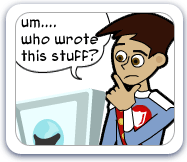
Check to see if the website has an author or an organization that runs it. Sites belonging to a real organization like National Geographic or NASA are more likely to be reliable than mystery sites.
If the website is run by a well-known organization or is part of a scholastic organization (like a university or a research institute), the information is more likely to be true. But be careful! Websites that the public can edit, such as Yahoo! Answers or Wikipedia, have little control over what their users post.
You can also look at what kind of domain the site is. The domain is the last part of the URL: .gov sites are government sites, .edu sites are educational sites, like a school or college, and .org sites are usually non-profit organizations, like churches and museums. These are more likely to be reliable than .com sites, which are usually commercial sites.
Where did they get their information?

Look for sites that include lists of references and source materials, which will explain where the author found the information. If they list their resources, it shows they did their homework!
While Wikipedia itself might not be the best resource because it has mystery authors, you can find some great resources just by going through the list of references on Wikipedia articles.
Is it True?
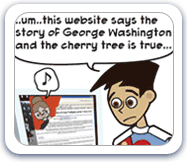
Sometimes even reliable websites can unintentionally contain false information. News sites can have false reports if the journalist didn't properly verify a story or they were tricked by a hoax. Sites like Wikipedia allow anyone on the Web to contribute content and the information can be incomplete, biased, or just plain wrong.
Always double check your Web research against as many sources as possible, especially information from sites that contain disclaimers about their content.
How old is it?
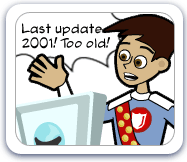
A resource is a lot more likely to be useful if it is up-to-date. Find out when the website was created and when it was last updated. Sometimes old information can be incorrect, especially if it is related to current events.
You can also check to see if all the links on the website still work. Broken links can mean that a site has not been updated in a long time.
Does it look professional?
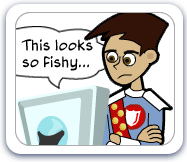
Reliable sites are usually built and maintained by a team of designers and content experts and look very professional. If a site is full of errors such as typos and broken links and inconsistencies such as images and advertisements that donít relate to the content, it is much less likely to be a reliable site.
To be on the safe side, no matter what the site looks like, you should always double-check the information on it against a trusted source.
What do others think of the site?

Reliable websites are frequently recommended by other websites. You can check to see how many backlinks there are to a site by typing "link:" followed by the full site URL into a search engine. Sites with fewer links to them also tend to be listed further down in search engine results.
You may also want to search for other people's opinions about the site and its author and see what they have to say about them. Try to be objective when reading other people's opinions and reviews though. Some people will write nasty reviews just to be mean.
Is it Fact or Opinion?
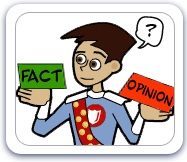
Facts are known to be true and can be used to prove a point. Opinions are what someone thinks about a topic. Instead of proving a point, they can only agree or disagree with it. A site's information could be opinion if:
- It only presents one side of the story, or key information about the topic is left out
- It is paid for by an organization that has a specific position on the topic, or the author has something to gain by only presenting one side of the story
- It does not cite other resources for the information presented
- It presents an extreme view of the topic
- It does not state the reasons for why it is presenting information on the topic
Reports usually focus on facts, but sometimes it's necessary to research opinions on a topic as well. If you're unsure whether you should be researching facts or opinions about your topic, check with your teacher.
Searching for Resources | Evaluating the Information | Using Web Resources

